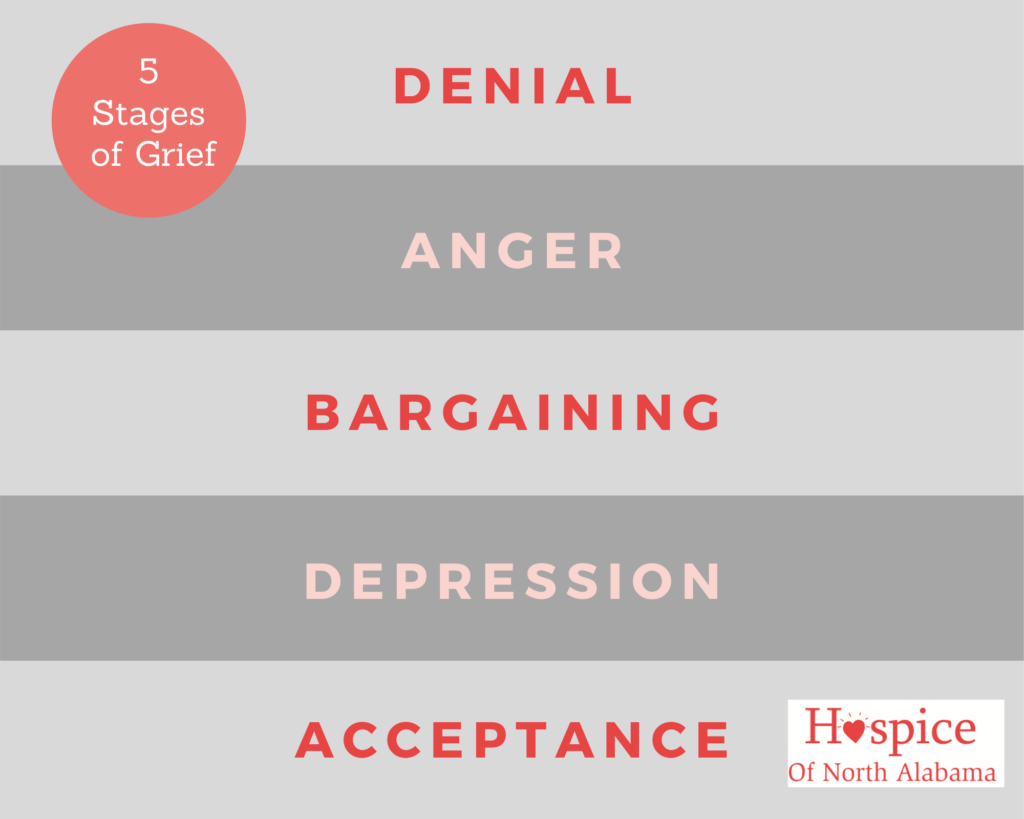
Five Stages of Grief
Losing someone we love leaves us with feelings of unbearable pain, and while everyone grieves differently, there are five stages of grief that most people go through after experiencing a loss. Very Well Mind describes the five stages as follows.
Denial
The first stage of the grief process is denial. In this stage, we are trying to process the reality of the loss of our loved one. When we hear the phrase ‘denial,’ we assume it means we are attempting to pretend the loss does not exist. While this is denial, it is only a part of this stage. Experiencing denial also means we are trying to absorb and understand what is happening. When we lose a loved one, there is a lot of information to process at once. Denial attempts to slow down this process and take us through one step at a time to avoid the risk of feeling overwhelmed by our emotions. It takes time for our minds to adjust to the new reality of life without this person, and denial helps us to minimize the overwhelming pain of the loss.
Anger
Next, we move into the anger phase. Anger is very common to experience and tends to be the first thing we feel when we start to release our emotions related to loss. There is so much for our mind to process, and anger can serve as an emotional outlet. We become overwhelmed with feelings of sadness and vulnerability, and sometimes anger feels like the only way to express these feelings. We may also fear judgment or rejection if we admit that we feel vulnerable or scared so anger may feel like a safer way to express our emotions.
Bargaining
When we experience a loss, it is not unusual to feel so desperate that we are willing to do whatever it takes to alleviate the pain. This often comes in the form of bargaining, typically with a higher power. We often feel helpless, and bargaining can give us a perceived sense of control over something that feels so out of control. There are a variety of promises that people may make when bargaining. These can include things like, “God, I promise to turn my life around if you let this person live.” It is also common in this stage to recall times we said things we did not mean and wish we could go back and do things differently. We may also make drastic assumptions that if we had done things differently, we would not be in such an emotionally painful place in our life.
Depression
As the emotional fog begins to clear and panic begins to subside, we slowly start to really look at our new reality. At this point, bargaining no longer feels like an option, and we are forced to face what is happening. In this stage, the loss feels more present and unavoidable, and we feel it more abundantly. This can be extremely isolating, as we tend to pull inward as our sadness grows.
No one should ever have to face depression alone. If you or a loved one is struggling with depression, contact the Substance Abuse and Mental Health Administration (SAMHSA) Helpline at 1-800-662-4357 or the National Suicide Prevention Lifeline at 1-800-273-8255.
Acceptance
When we reach the stage of acceptance, it is not that we no longer feel the pain of the loss. It means we are no longer resisting the reality of our situation. Feelings of sadness and regret can still be present once we have reached acceptance. However, the emotional survival tactics of denial, bargaining, and anger are less likely to be present.
We All Grieve Differently
Not everyone will experience each of these stages, while others may linger in one stage longer than others. It is important to remember that we all grieve differently. Your grief is unique to you, just like your relationship with the person you lost is unique. It is perfectly acceptable to feel whatever you are feeling.
If you or a loved one would like grief support, please contact us to learn more about our bereavement services. You do not have to face this alone. We are here for you.


